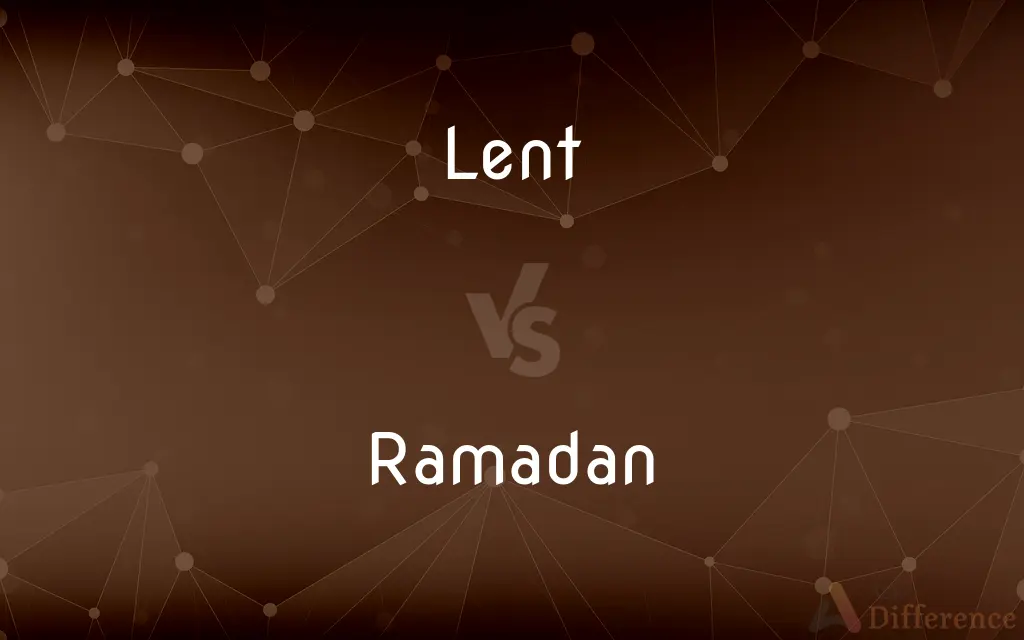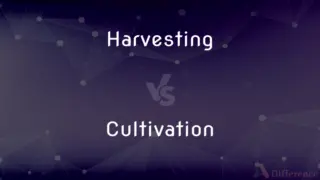Lent vs. Ramadan — What's the Difference?
By Fiza Rafique & Urooj Arif — Updated on March 20, 2024
Lent is a Christian period of fasting and reflection lasting 40 days before Easter, focusing on penance and prayer. Ramadan is an Islamic month of fasting from dawn to sunset, emphasizing self-discipline, worship, and charity.

Difference Between Lent and Ramadan
Table of Contents
ADVERTISEMENT
Key Differences
Lent begins on Ash Wednesday and lasts for 40 days, not counting Sundays, leading up to Easter Sunday. It commemorates Jesus Christ’s fasting in the desert. During Lent, Christians engage in fasting, prayer, penance, and acts of charity, aiming to prepare spiritually for Easter. On the other hand, Ramadan is the ninth month of the Islamic lunar calendar, observed by Muslims worldwide as a month of fasting, prayer, reflection, and community. The fast during Ramadan is one of the Five Pillars of Islam and lasts from dawn until sunset, abstaining from food, drink, and other physical needs.
During Lent, fasting is more flexible compared to Ramadan. Christians may fast from a particular food or activity throughout Lent or on specific days, such as Ash Wednesday and Good Friday. In contrast, Muslims fast strictly from dawn to sunset during Ramadan, refraining from eating, drinking, smoking, and marital relations, with the fast broken each day with a meal called iftar.
Lent is a time for Christians to reflect on Jesus Christ’s suffering and sacrifice, often involving giving up luxuries, increased almsgiving, and additional church services. Whereas Ramadan focuses on purifying the soul, drawing closer to God, and expressing empathy for the less fortunate. It is also a time for increased prayer, reading the Quran, and performing good deeds.
The end of Lent is marked by Holy Week, culminating in Easter Sunday, celebrating the resurrection of Jesus Christ. The conclusion of Ramadan is marked by Eid al-Fitr, a festive day of feasting and celebration, where Muslims perform a special prayer service, give charity to the poor, and enjoy meals with family and friends.
While both Lent and Ramadan are observed by significant abstinence, their practices, duration, and spiritual emphasis differ, reflecting the distinct religious teachings and cultural traditions of Christianity and Islam.
ADVERTISEMENT
Comparison Chart
Duration
40 days (excluding Sundays)
29-30 days (lunar month)
Religious Tradition
Christianity
Islam
Purpose
Preparation for Easter, reflection on Jesus' sacrifice
Self-discipline, closeness to God, empathy for the poor
Fasting
Partial (e.g., certain foods, activities)
Total from dawn to sunset (food, drink, etc.)
Observances
Prayer, penance, almsgiving, fasting
Fasting, increased prayer, Quran reading, charity
Key Days
Ash Wednesday, Good Friday, Easter Sunday
Laylat al-Qadr, Eid al-Fitr
Culmination
Easter Sunday (Jesus Christ’s resurrection)
Eid al-Fitr (Feasting and charity)
Compare with Definitions
Lent
Lasts 40 days leading up to Easter.
Many Christians attend additional church services during Lent.
Ramadan
Emphasizes self-discipline and worship.
She spends more time in prayer and reading the Quran during Ramadan.
Lent
Begins on Ash Wednesday.
Ash Wednesday marks the start of Lent with the distribution of ashes.
Ramadan
One of the Five Pillars of Islam.
Observing Ramadan is a fundamental practice for Muslims.
Lent
Focuses on prayer, fasting, and charity.
He volunteered at the food bank as part of his Lenten observance.
Ramadan
A month of fasting in Islam.
During Ramadan, Muslims fast from dawn until sunset.
Lent
Culminates in Easter.
Lent prepares believers for the celebration of Easter Sunday.
Ramadan
Includes charity and community meals.
They organize iftar dinners to break the fast together.
Lent
A Christian period of fasting and reflection.
She gave up chocolate for Lent as a form of penance.
Ramadan
Ends with Eid al-Fitr.
Ramadan concludes with the celebration of Eid al-Fitr, a day of feasting.
Lent
Lent (Latin: Quadragesima, 'Fortieth') is a religious observance in the Christian liturgical calendar that begins on Ash Wednesday and ends approximately six weeks later; depending on the Christian denomination and local custom, Lent concludes either on the evening of Maundy Thursday, or at sundown on Holy Saturday, when the Easter Vigil is celebrated. Regardless, Lenten practices are properly maintained until the evening of Holy Saturday.
Ramadan
The ninth month of the year in the Islamic calendar. See Table at calendar.
Lent
(in the Christian Church) the period preceding Easter, which is devoted to fasting, abstinence, and penitence in commemoration of Christ's fasting in the wilderness. In the Western Church it runs from Ash Wednesday to Holy Saturday, and so includes forty weekdays.
Ramadan
A fast, held from sunrise to sunset, that is carried out during this period.
Lent
Past tense and past participle of lend.
Ramadan
The ninth Mohammedan month.
Lent
A 40-day period of fasting and penitence observed by many Christians in preparation for Easter. In Western churches, Lent lasts from Ash Wednesday until Easter, usually excepting Sundays.
Ramadan
The great annual fast of the Mohammedans, kept during daylight through the ninth month.
Lent
Simple past tense and past participle of lend
Ramadan
The ninth month of the Islamic calendar; the month of fasting; the holiest period for the Islamic faith
Lent
A fast of forty days, beginning with Ash Wednesday and continuing till Easter, observed by some Christian churches as commemorative of the fast of our Savior.
Ramadan
(Islam) a fast (held from sunrise to sunset) that is carried out during the Islamic month of Ramadan
Lent
Slow; mild; gentle; as, lenter heats.
Lent
See Lento.
Lent
A period of 40 weekdays from Ash Wednesday to Holy Saturday
Common Curiosities
Can children fast during Ramadan?
Children are not required to fast during Ramadan until they reach puberty, though some may participate in partial fasts as practice.
What is the significance of fasting during Ramadan?
Fasting during Ramadan is meant to teach Muslims self-discipline, bring them closer to God, and remind them of the suffering of the poor.
Are there exemptions from fasting during Lent and Ramadan?
Yes, both religions offer exemptions. In Christianity, the sick, young, and elderly may be exempt from strict fasting rules. In Islam, the sick, travelers, pregnant and nursing women, and young children are exempt from fasting during Ramadan.
How do the dates for Lent and Ramadan differ each year?
Lent is calculated based on the Gregorian calendar, starting on Ash Wednesday, 46 days before Easter Sunday. Ramadan's timing varies in the Gregorian calendar, as it is based on the lunar Islamic calendar.
What are common practices during Lent?
Common practices include fasting, prayer, abstaining from certain luxuries, and performing acts of charity.
What happens if someone accidentally breaks their fast during Ramadan?
Accidental consumption does not invalidate the fast, but deliberate breaking without a valid reason requires making up the fast later or performing a compensatory act of charity.
How is the end of Ramadan celebrated?
Ramadan ends with Eid al-Fitr, a celebration that includes a special prayer, giving charity to the poor, and enjoying meals with family and friends.
Why do Christians observe Lent?
Lent is observed as a period of reflection and preparation for Easter, focusing on repentance, fasting, and devotion.
Can non-Muslims participate in Ramadan activities?
While non-Muslims are not expected to fast, they are welcome to join in iftar meals and learn about Ramadan traditions.
What is the importance of Easter in Christianity?
Easter is the most important Christian holiday, celebrating the resurrection of Jesus Christ from the dead, symbolizing victory over sin and death.
Share Your Discovery

Previous Comparison
Recede vs. Fade
Next Comparison
Harvesting vs. CultivationAuthor Spotlight
Written by
Fiza RafiqueFiza Rafique is a skilled content writer at AskDifference.com, where she meticulously refines and enhances written pieces. Drawing from her vast editorial expertise, Fiza ensures clarity, accuracy, and precision in every article. Passionate about language, she continually seeks to elevate the quality of content for readers worldwide.
Co-written by
Urooj ArifUrooj is a skilled content writer at Ask Difference, known for her exceptional ability to simplify complex topics into engaging and informative content. With a passion for research and a flair for clear, concise writing, she consistently delivers articles that resonate with our diverse audience.













































